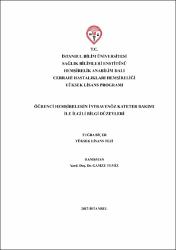Öğrenci hemşirelerin intravenöz kateter bakımı ile ilgili bilgi düzeyleri
Citation
Biçer T. (2017). Öğrenci hemşirelerin intravenöz kateter bakımı ile ilgili bilgi düzeyleri. Yayımlanmamış yüksek lisans tezi. İstanbul : İstanbul Bilim Üniversitesi, Sağlık Bilimleri Enstitüsü.Abstract
Amaç: Bu çalışmada hemşirelik öğrencilerinin intravenöz kateter bakımı ile ilgili
bilgi düzeyini değerlendirmek ve çalışma sonuçları doğrultusunda öğrencilerin bilgi
düzeylerini geliştirmeye yönelik önerilerde bulunmak amacı ile yapıldı.
Gereç ve Yöntem: Araştırma İstanbul Bilim Üniversitesi Florence Nightingale
Hastanesi Hemşirelik Yüksekokulu’nda öğrenimlerini sürdüren ve araştırmayı kabul
eden 211 hemşirelik öğrencileri ile tanımlayıcı olarak yürütüldü. Veriler kurum izni
ve etik kurul onayı alınarak anket formu ile toplandı. Anketler SPSS (Statistical
Program For Social Sciences) 22.0 programı kullanılarak değerlendirildi.
Bulgular: Öğrenci hemşirelerin intravenöz kateter bakımına ilişkin bilgi düzeyi
değerlendirme formu puanları 20,15± 2,349 olarak bulunmuş olup, sosyo demografik
verilere göre karşılaşması yapıldığında cinsiyetlerine, daha önce intravenöz kateter
bakımı ile ilgili eğitim alma durumlarına göre istatistiksel olarak anlamlı bir fark
belirlendi (p<0,05).
Sonuç: Öğrenci hemşirelerin intravenöz kateter bakımı ile ilgili bilgi düzeylerinin
arttırılmasına gereksinim vardır. Bunun için öğrencilerin konu ile ilgili teorik
eğitimlerinin yanı sıra, görsel öğrenme teknikleri ve simülasyon uygulama
yöntemleri kullanılarak bilgileri pekiştirilmelidir Aim: The aim at the study is to examine it is planned with the aim to measure the
knowledge and behavior of nursing students about intravenous catheter care and to
make suggestions to improve the knowledge and behavior levels of the students in
line with the study results.
Materials and Methods: The study was conducted as a descriptive study with 211
nursing students who continued their studies at Florence Nightingale Hospital School
of Nursing at Istanbul Science University and accepted to research. The data were
gathered by the questionnaire form with the approval of the institution and approval
of the ethics committee. The questionnaires were evaluated using the SPSS
(Statistical Program For Social Sciences ) 22.0 program
Findings: The scores of the knowledge level assessment form for the intravenous
catheter nursing of the student nurses were found as 20,15 ± 2,349, a statistically
significant difference was found according to socio-demographic comparison
according to gender and prior education regarding intravenous catheter care
(p <0,05).
Conclusion: It is necessary to increase the knowledge level of the students about the
intravenous catheter care. To do this, students should be encouraged to use visual
learning techniques and simulation application methods as well as their theoretical
training on the subject.


















